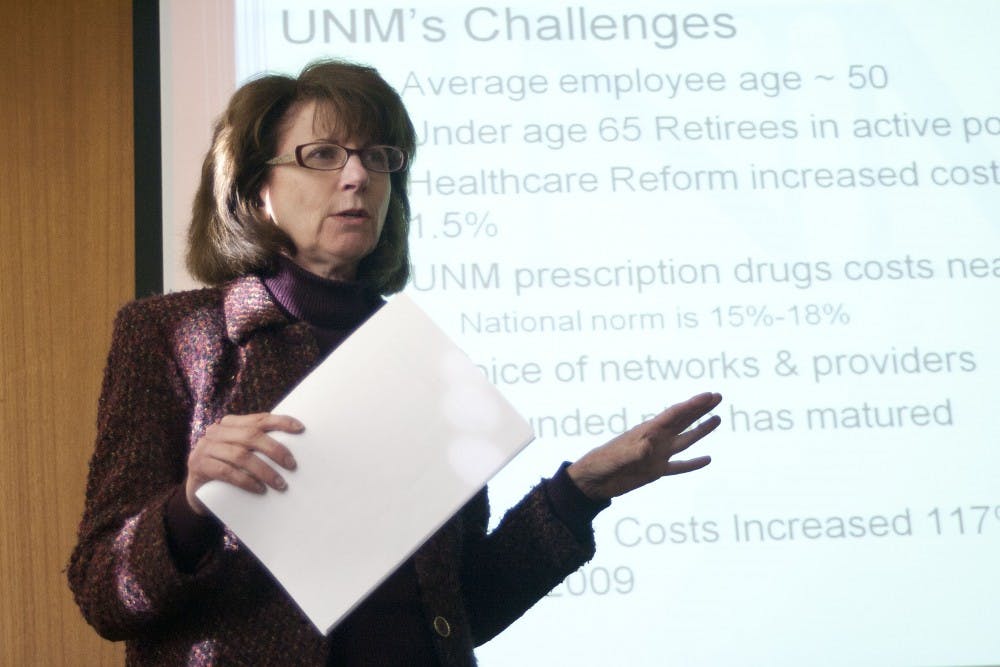UNM employees may have to foot a projected multi-million dollar shortfall in the University’s health plan.
Employees could experience an 8 percent increase in insurance premiums if the administration decides to make them pay the $6.2 million shortage.
During the Faculty Senate meeting Tuesday, Vice President of Human Resources Helen Gonzales said the projected cost for employee health care in FY 2013 is $61.7 million. Current funds from employee contributions, interest earnings from the fund and the Early Retirement Reinsurance Program total only $55.5 million.
Gonzales said the University is looking at different ways to meet the difference, and that may mean faculty have to pay more for the rising costs of health care.
“It isn’t a shortfall at this time, but if we experience claims utilization at the expected trend, we will need to have the funds to pay it,” she said.
Gonzales said health care costs have risen steadily in recent years, increasing 117 percent from FY 2000 to FY 2009. In FY 2010, UNM dropped its private insurance partnership and became self-insured. Since then, employee premiums have increased once in FY 2011 by as much as 2 percent.
Gonzales said increased lifespan, health care reform laws and the increasing average age of UNM employees, which now stands at 50 years, have driven costs higher. Faculty Senate President Timothy Ross said the employees will most likely be the ones who have to pay to close the shortage.
“There’s a reality here that health care costs are going up, that people are living longer and so, how are we going to pay for it?” he said. “We don’t really have any mechanisms for that other than employees’ pay. The University is already paying a sizable percentage of those costs: 50 percent or more of our premiums are paid for by the University, but when the costs go up, the employees are going to have to pay a little more.”
Also at the Senate Meeting: Honors College
Plans for a new degree-granting honors college at UNM, eventually replacing the honors program, could be a reality by this spring, Ross said. He said the Senate could begin the process right away with two steps. The first calls for a Senate vote to begin the formation of the college. He said Policy A88 of the Faculty Handbook allows the Senate to establish the college by Senate vote and approval of the provost.
Ross said the second step — the development and approval of the curriculum and degrees — will take more time.
“That’s a longer process because of all the forms that have to be signed and debated by various committees that have to see these forms,” he said. “That process will take a little bit longer and may not be concluded until the end of summer.”
Get content from The Daily Lobo delivered to your inbox
Senior Vice Provost Michael Dougher said it would cost $1.5 million to get the college running, but that it is expected to generate $1.9 million in additional student enrollment and residence-hall fees. In the more distant future, he said the University might build a new facility to house the new honors college, the projected cost of which would be about $79 million.
“That money would come from something like a (general obligation) bond and maybe the (UNM) Foundation would be able to generate some donors who could contribute to the support of the honors college,” he said.
Dougher said a benefit for UNM students with an honors degree is the edge it gives them in the employment market, and would also allow students flexibility in choosing classes to fit their needs.
“It would be a degree that the student could design,” he said.
“Interdisciplinary is something that is increasing in all fields, the sciences or the arts or humanities, so taking a multidisciplinary approach to a topic makes that person more effective in dealing with that. We will have to name these degrees that would convey the discipline subject matter that the students master as they go through the honors college.”






